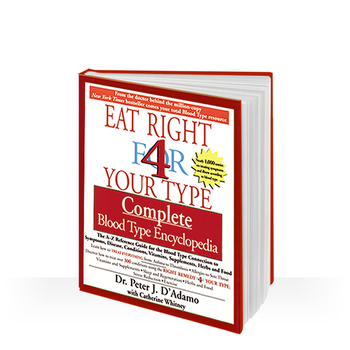Ask Dr. D'AdamoAsk Dr. D'Adamo Index | Latest Entry | Pull a Random Question |
Mostly Editorial EntriesDo Antioxidants Block Radiation Therapy?QUESTION Are antioxidants taken as supplements (vitamin C, E, grapeseed, coenzyme Q10) a deterrent to the effectiveness of radiation treatments for cancer? When my husband was diagnosed with base tongue cancer (squamous carcinoma) approximately 6 weeks ago I began to study treatments. Influenced by what I had read in your books I sought out an alternative medicine physician. The physician I found recommends your books highly (I was happy to tell her I had read them). After a consultation she prescribed a large regimen of supplements for my husband to take while he underwent radiation. However, the oncologist insists antioxidants inhibit the effectiveness of radiation - actually preventing the radiation from doing its job. When I relayed this opinion to our alternative med physician she said that his opinion was nonsense. She says radiation creates free radicals and the antioxidants help to get rid of these, thus enhancing the effectiveness of the radiation and helping it to do its job. We are torn. Who do we believe? ANSWER It has been a matter of speculation (and nothing much more) that antioxidants block the effect of chemotherapy and radiotherapy, since these in essence have their therapeutic effects due in part to the disruption of genetic material in the cancer cell by the generation of free-radicals. In reality, this is about as feasible as expecting a brown bag lunch to block the Metro North New Haven Line at rush hour. In a review of this very issue, a colleague and friend, David Lamson, ND, wrote the following: "Reducing complicated interactions to a single sentence can be an oversimplification. In many instances the effect of an antioxidant compound with a certain therapeutic agent may be specific to a particular tumor type, or may vary with dosage of both antioxidant and chemotherapy. This guide is best used as a means of quickly identifying which antioxidants are likely to be indicated or contraindicated with a particular therapeutic agent. Please refer either to the earlier review (Altern Med Rev 1999;4(5);304-329) or the original research reports for more information on these interactions. Many of these interactions have been studied only in vitro. While an in vitro result is often a predictor of in vivo response, this is not always the case. The interaction between the bioflavonoid tangeretin and tamoxifen is a good example of the risk in placing too much emphasis on in vitro evidence. Tangeretin was found in vitro to act synergistically with tamoxifen; but in vivo tangeretin completely reversed the inhibitory action of the drug on experimental mammary tumors.(2) The authors wish to emphasize that combinations not studied in vivo risk potential adverse reactions and should be monitored closely or avoided altogether. Similarly, it must be assumed that any antioxidant found to reduce in vivo toxicity of cancer therapy on healthy tissue has the potential to decrease effectiveness of the chemotherapy unless this was specifically studied. The studies reporting reduced toxicity to healthy tissue of a therapeutic agent with unknown effects on treatment outcomes are only reported if the reduction was noted in human studies. The following tables summarize the effect of various antioxidants when combined with specific chemotherapeutic agents or radiation. (1- 7). Conclusion There are only three presently known examples in which an agent classifiable as an antioxidant has been shown to decrease effectiveness of radiation or chemotherapy in vivo. The vast majority of both in vivo and in vitro studies have shown enhanced effectiveness of standard cancer therapies or a neutral effect on drug action. 1. Lamson DW, Brignall MS. Antioxidants in cancer therapy; their actions and interactions with oncologic therapies. Altern Med Rev 1999;4:303-328. 2. Bracke ME, Depypere HT, Boterberg T, et al. Influence of tangeretin on tamoxifen's therapeutic benefit in mammary cancer. JNCI 1999;91:354-359. 3. Duchesne GM, Hutchinson LK. Reversible changes in radiation response induced by all-trans retinoic acid. Int J Radiat Oncol Biol Phys 1995;33:875-880. 4. Park TK, Lee JP, Kim SN, et al. Interferon-alpha 2a, 13-cis-retinoic acid and radiotherapy for locally advanced carcinoma of the cervix: a pilot study. Eur J Gynaecol Oncol 1998;19:35-38. 5. Seifter E, Rettura G, Padawer J. Vitamin A and beta-carotene as adjunctive therapy to tumour excision, radiation therapy and chemotherapy. In: Prasad K, ed. Vitamins Nutrition and Cancer. New York: Karger Press; 1984:2-19. 6. Mills EED. The modifying effect of beta-carotene on radiation and chemotherapy induced oral mucositis. Br J Cancer 1988;57:416-417 7. Hanck AB. Vitamin C and cancer. Prog Clin Biol Res 1988;259:307-320. |

|
The statements made on our websites have not been evaluated by the FDA (U.S. Food & Drug Administration).
Our products and services are not intended to diagnose, cure or prevent any disease. If a condition persists, please contact your physician.
Copyright © 2015-2023, Hoop-A-Joop, LLC, Inc. All Rights Reserved. Log In


